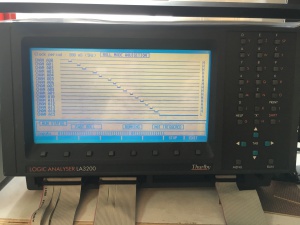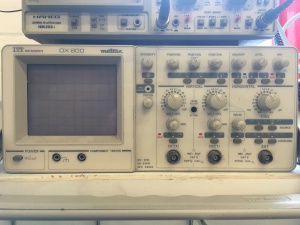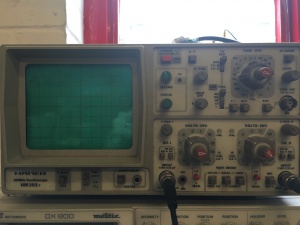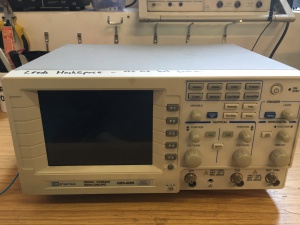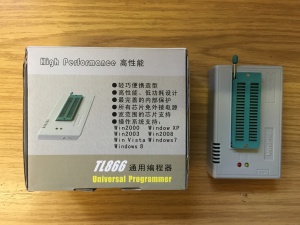Electronics
Here you'll find details about the Electronics workshop, what test equipment we have and any available documentation.
Safety
You must read the safety documentation in this link before using the equipment.
Safety is key, do not take un-necessary risks. You are in an environment with inexperienced people around you. Be considerate of everyone's safety.
Test Equipment
Other Equipment
- Various oscilloscope probes, choose a probe with a larger bandwidth than the oscilloscope
- Skytronic adjustable Power Supply Unit (PSU), 0-20 Volts, 2 Amps, single output
- Maplin XM19V fixed output power supply unit, 13.8 Volts, 7 Amps continuous single output
- Function generator - members project
- Digital handheld multimeters, about 6 off, various types
- Assortment of test leads
Soldering Equipment
- Hot air SMD rework station with soldering iron - Clean soldering iron tips and turn off after use to extend the tips life
- Solder station - Solder and desoldering irons - Clean soldering iron tips and turn off after use to extend the tips life
- Various other soldering irons - about 5 by the last count
- Solder, leaded and lead-free (wash hands after use), magnifiers, cleaners etc.
- UV exposure box (Needs glass repairing)
- Small oven for reflow of SMD PCBs using solder paste
PCB Board Etching
Its great fun to etch your own PCBs. Unfortunately at present (2 April 2016) we do not encourage etching boards at the space due to various reasons including chemical disposal, though this may change over time. So please ask on the mailing list what the current status is. It is recognised that this would be a nice-to-do item. Update this section as soon as this changes!
Misc Tools
- Bench lamp with magnifier
- Magnifier headset
- Tools
- Wire of various sizes
- Components free for members use within reason and some to buy which are owned by members
Things we'd like
- Linear dual 5A, 0-30V PSU
- Bus pirates (Yarrr Jim lad/lady) - Hack to be able to trigger a scope on specific device addresses or traffic
- PAT tester (newish or in cal)
- Spectrum analyzer, 50 ohm, Hopefully with generator and return loss bridge (portable would be nice too:-) )
- RF 50 ohm cal kit
- RF frequency generators
- RF power meter
- Bench multimeter (eg 5 1/2 digits or more)
- Component sample books - SMD and TH, caps, res, inductors
- Full size antistatic table mats
- Power meter
- Electronic DC Load
- Current probes
- Metcal soldering irons (lead-free types)
- Small pick n place
- PCB shears
- Microscope
External Resources
Schematic capture and layout packages
There are too many Electronics (EDA) design packages to name, but a few of the more popular ones are listed below.
- Eagle CAD - Arguably the most popular hobby/maker level package. Has a free version, but is limited in PCB size and layers. Available on Windows, Linux and Mac. A lot of PCB fabricators offer to take the raw eagle cad files to generate your PCBs instead of you having to generate gerbers. Eagle cadsoft is owned by Farnell/Element 14. You can link your parts to the Farnell website for live pricing. Though its easier to search onling and input parts from the website.
- KiCAD - Open source unlimited layers. Much improved over recent years. Available on Windows, Linux and Mac.
- Others are fritzing (open source cross platform), Design spark, circuitmaker,
Circuit Simulation
- LTspice - Professional tool. Popular simulation software
- Simmetrix - Professionsal tool. Free and paid for simulation software, node limited, but the limit is generous enough to use successfully
- Various much simpler circuit simulation tools now exist
PCB Fabrication Companies
PCB fabrication is the act of making the PCB itself.
Huge numbers of PCB fabricators exist. Here are a few of the low cost companies. Most will accept Eagle PCB files directly instead of sending gerber files. Some fabricators provide design rule constraints files (.dru for eagle) used for your layout design rule checks (DRC). You should obtain these or input them before you start your layout as they will stop layout issues. Others fabricators provide gerber output CAM setup files for eagle. For KiCAD you will often have to set this up manually or via a PCB template. OSH park has some simple KiCAD design rule information on their website. One final thing is that many manufactures have a 'design guide' which is useful in understanding PCB technology and limitations.
- Ragworm - UK. low cost PCB company
- OSH Park - US. Good for very small PCBs. Other companies produce cheaper larger PCBs. Has an excellent PCB viewer which you can use to see how your files will look when made. Worth using just for this feature.
- Elecrow - China. Cheap PCBs in many colours - arguably the cheapest around
- Seeed studio - China. Similar to elecrow
- ITead studio - China. Similar to elecrow
- Wurth Direct - EU. High quality PCBs, higher pricing than others. Overly complicated design rule constraints for each of their many different PCBs, but track/gap specifications are much improved over the other companies mentioned above.
- Lady Ada PCB fabricator list
- Various companies also make SMD stencils using, for example, mylar (cheap) or stainless steel (more professional long lasting)
Note: If your design has tracking which requires specific impedance controlled lines eg R.F. or high speed digital tracks such as USB, SATA, ethernet etc. You need to be aware of the boards layer stackup before designing the PCB. Here is just one differential signal Impedance Calculator. Properly tested impedence controlled boards are more expensive. You can usually get things working reasonably well with normal boards if you set them up correctly at the design stage.
PCB Assembly Companies
PCB assembly means putting the components onto the PCB.
We've no specific experience with low cost assembly companies to guide you with here. Though companies such as elecrow and other low cost PCB fabricators perform this service. Most PCB assembly companies have a stock of standard components. You will then supply the remainder of your components. Sometimes SMD reels are required and sometimes extra components are required due to losses when setting up the pick and place machines and ongoing losses due to dropped picks. If you are manufacturing small quantities with lowish component counts through hole is still an option, which many will hand assemble. In general you discuss these details with the assembly company before deciding whether you are right for each other.
Be aware that if your a hobbyist or are making a very low volume products, you need a manufacturer who fits you and your requirements. Large volume manufacturers will be less interested in you and your product. You may be put on hold messed around etc if your not important to them.

